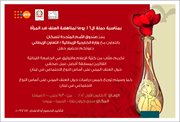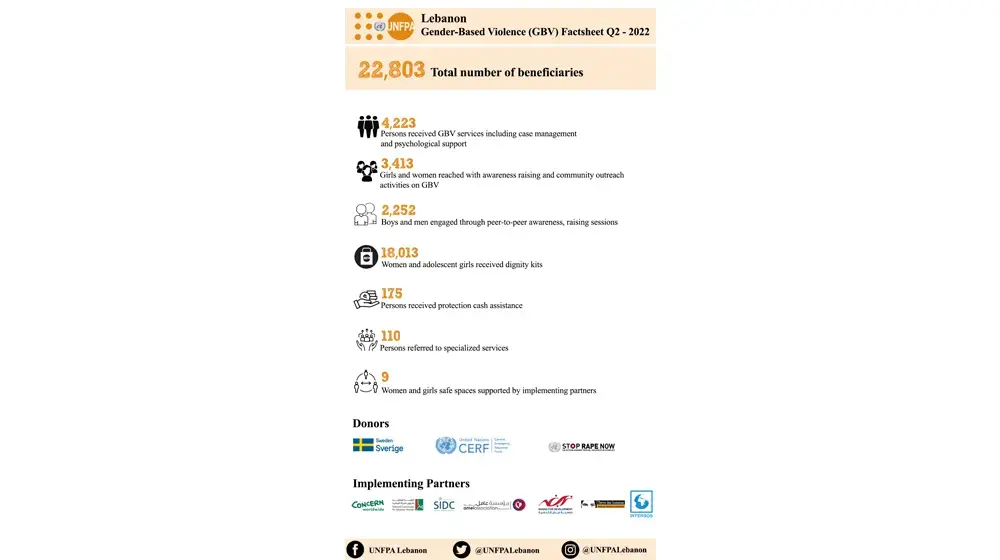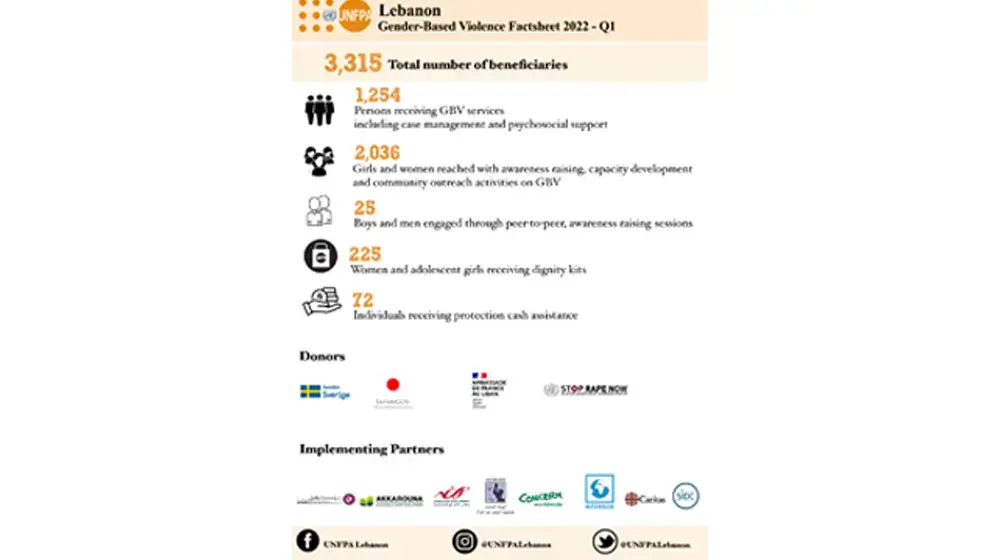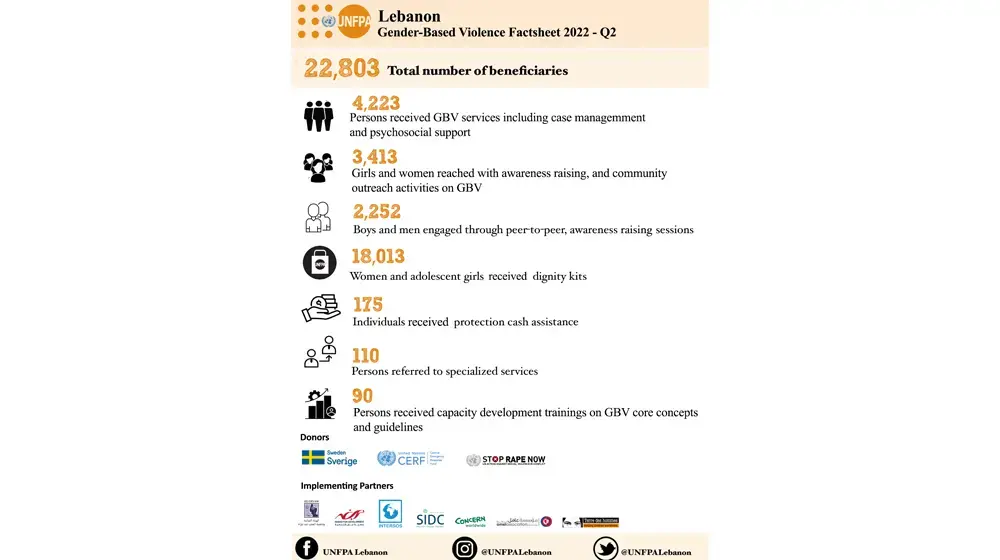
The following article won the first prize in the GBV Article-Writing Contest among Lebanese University Students - Faculty of Journalism and Documentation, organized by the UNFPA Lebanon. The views expressed in this article are those of the author and do not necessarily reflect the views of UNFPA.
Name: Reine Ibrahim
Major: Masters' Degree - Faculty of Journalism and Documentation
Will the Law Grant Her Justice?
She stood there dumbfounded trying to grasp the cold and strange behavior of this visitor who only resembled her husband in outward appearance. But moments later, she regained her composure, and kept telling herself that her husband was still tired from the plane ride and the hardships of working abroad. However, she could not remain silent towards his aversion and disaffection, so she decided to confront him about his strange behavior, but he only told her that he was not feeling well and provided no other explanations.
Half a month had passed. One day, in the middle of the night, while she was sound asleep, he viciously attacked her like a mad man. As soon as he was done, he left her bleeding, twisting on the floor and wailing from pain as he watched her without lifting a finger. An hour later, he decided to take her to see his friend, the doctor, who refused to examine her and was content with prescribing medications to stop the bleeding which stopped after three days. As the wife's pain subsided within seven days, her mental anguish never deserted her, and she became a woman who felt disgusted with herself and her body. Her husband whose return she anxiously awaited not only raped her body but her soul as well. He did not beat her, he destroyed her. She did not reject him and she did not refuse him his rights as a husband, so why did he behave in such a violent and cruel manner?
The wife, whose dream of reuniting with her expatriate husband transformed into a nightmare that violated her body and soul. She is not a female lead in a movie or a drama series; she is a real victim of gender-based violence.
To avoid being raped twice, first by her husband and second by the laws and legislations in place, she chose to share her bitter testimony on the stage of Babel Theater, Hamra, in a symbolic court trial on marital rape crimes, alongside three other women who were victims of marital rape. All four women ended their testimony with a call for the Parliament to stop distorting the draft law on the “Protection of Women from Family Violence" and abrogating the marital rape crime.
This symbolic court trial came as a response to the Parliamentarian Sub-Committee in charge of studying the draft law, which announced through its Chairman MP Samir el-Jisr on 2/8/2012 having introduced some amendments to the draft law, and exerting great effort to draft a law that actively protects women from any violence within the family and at the same time takes into consideration community values to safeguard families without neglecting individual rights. The Committee also denied the existence of marital rape, repealed the relevant article in the draft law, as well as the clause on filing a complaint by way of notification.
As soon as the Committee submitted the final draft of the law, the voices of non-governmental organizations rose high against the amendments that they believed were distorting the law. As part of these NGOs, the National Coalition for Legalizing the Protection of Women from Family Violence sent a letter to the Parliamentary Sub-Committee assigned to study the draft law on "the Protection of Women from Family Violence", in which it urged the Sub-Committee to reconsider the amended articles which would empty the law of its content. This letter refuted with legal arguments and proofs the most dangerous amendments made to the draft law, such as the articles related to marital rape, the protection order, and the issue of custody, as well as article 26 on the provisions of the Personal Status Courts. For instance, article (3) was amended as follows:
"Any person, who for the purpose of asserting his marital rights or as a result thereof, abuses and assaults a spouse, shall be punished with one of the sanctions stated in articles (554) to (559) of the Penal Code. In case of recidivism, a heavier penalty shall be imposed in accordance with the provisions of article (257) of the Penal Code. Renunciation by the complainant shall extinguish the public prosecution and the provisions of articles (554) and (555) of the Penal Code shall apply".
The National Coalition for Legalizing the Protection of Women from Family Violence considered that "such a text is unnecessary given that the Penal Code provides for the criminalization of abuse and assault and does not stipulate as a condition to demonstrate the reason that led to the act of abuse and assault. Under the current Penal Code, the victim of abuse and assault during intercourse can file a complaint for battery as per the provisions of article (554) ff. in the Penal Code".
According to the Coalition, "What's required is criminalizing the violation of the sanctity of a woman's body but the proposed text does not criminalize it, i.e. the act of coercion itself. The text, as stated, is an attempt to circumvent the law. If the Committee is convinced that sexual coercion is not permissible, even through threats which are a form of mental abuse, why not seek to criminalize it directly instead of attempting to circumvent the law by way of criminalizing what was criminalized to begin with?"
Furthermore, it is dangerous to ratify this draft law without abrogating article (26) which gives precedence to Personal Status provisions, in the event of a contradiction between said provisions and the provisions of the Draft Law for the Protection of Women from Family Violence. In accordance with this article, Family courts shall have the prerogative to pronounce the act as violent or not, and hence if it is punishable or not by virtue of this law.
Amidst this great divide between NGOs working on women's rights and the legislations and laws knitted with the wool of patriarchy, women victims of marital rape are still facing two major worries: the first concerns the husband who is only human in form, and the second concerns the fragility of the laws which destroy the family instead of seeking to safeguard it! When women, wives and mothers are victims of abuse, the family becomes at risk of dissolution.
The four victims of rape, who shared their adversities on the stage of Babel Theater with the hope of sensitizing politicians and legislators, are not alone in this plight. They are only a sample mirroring every woman who was ever destroyed by violence and alienation until she was filled with despair and lost the will to continue to live a married life. A woman who becomes frail like a fall leaf barely leaning on the tree branch, not knowing when her husband's rage would suddenly turn into a way to prove the moral masculinity that he fundamentally lacks, and is left to fall to her impending doom.
In conclusion, I say to all those who reject the term "marital rape", call it as you wish! Call it coercion, call it abuse, call it asserting marital rights, the act still exists and it is rape and it is the most heinous crime committed against women. Will women, with the support of NGOs working in this regard, finally have a draft law free of societal stereotypes and religious misconceptions that constitutes a lifeline for victims of marital rape?
التخصص: طالبة دراسات عليا في كلية الإعلام والتوثيق
أينصفها القانون ؟
"بعد غربة زوجها التي استمرّت ثلاث سنوات، هيّأت نفسها لاستقباله في الثالثة صباحا، وهي تعد الدقائق التي تفصلها عن لقائها المنتظر لحبيبها . ولحظة وصوله هرعت اليه مندفعة والشوق يملؤها وعندما همّت بضمّه اليها، تفاجأت به يقبّلها قبلة باردة على جبينها ثم يبعدها من أمامه.
وقفت مذهولة وهي تحاول استيعاب برودة وغرابة ذلك العائد الذي يذكرها فقط شكليا بزوجها, ولكنها ما لبثت بعد دقائق ان لملمت صدمتها، محاولة اقناع نفسها أن زوجها لا يزال تعبا من السفر ومن مشقات العمل في الخارج . ولكنها لم تستطع التزام الصمت أكثر أمام جفائه لها وعدم اقترابه منها، فصارحته باستغرابها ازاء تصرفاته ولكنّه اكتفى بالقول أنه مريض، دون تقديم أي شروحات أخرى.
وبعد مرور نصف شهر، وبينما كانت نائمة في منتصف الليل، انقضّ عليها بكل وحشية واعتدى عليها كالمجنون وحال انتهائه تركها نازفة تتلوى على الارض وتئن من الالم وهو يشاهدها بدون حراك .وبعد انقضاء ساعة قرّر اخذها عند صديقه الطبيب، الذي رفض أن يعاينها بل اكتفى بوصف الادوية لها كي يتوقف النزيف الذي انتهى بعد ثلاثة أيام . وفيما زال ألم تلك الزوجة في غضون سبعة أيام الا أن ألمها النفسي لم يفارقها حتى تلك اللحظة، فتحولت الى امرأة تشمئزّ حتى من ذاتها وجسدها، لأن زوجها الذي انتظرته بفارغ الصبر ليعود الى موطنه، اغتصب ليس فقط جسدها وانما أيضا روحها. لم يضربها بل دمّرها، رغم انها لم تمنعه عنها ولم ترفض أن تلبّي له حقوقه كزوج، فلماذا العدوانيّة والهمجيّة؟
أن تلك الزوجة التي تحوّل الحلم بلقاء زوجها العائد من الغربة، الى كابوس يغتال جسدها ووجدانها، ليست بطلة في احدى الافلام والمسلسلات الدراميّة، انما هي ضحية واقعيّة للعنف المبني على أساس النوع الاجتماعي.
وكي لا تغتصب مرتين، الاولى من زوجها والثانية من القوانين والتشريعات، روت شهادتها المريرة على خشبة مسرح بابل، في الحمرا ، في محاكمة صورية لجرائم الاغتصاب الزوجي، وترافقت معها شهادات ثلاث نساء أخريات تعرّضن للاغتصاب الزوجي. وقد ختمت كل من النساء الأربعة شهادتهن بنداء وجّهنه لمجلس النواب بالكفّ عن تشويه مشروع قانون حماية النساء من العنف الأسري والغاء جريمة الاغتصاب الزوجي. "
تلك المحاكمة الصوريّة أتت ردّا على اللجنة التي كلّفت دراسة مشروع قانون "حماية النساء من العنف الاسري" والتي أعربت، عبر رئيسها النائب سيمر الجسر، في 2 / 8/ 2012، أنها ادخلت بعض التعديلات على مشروع القانون وبذلت جهدا كبيرا في التوصل الى صوغ قانون يحمي المرأة بشكل فاعل من أي عنف داخل الاسرة, وفي الوقت نفسه يراعي القيم المجتمعية في الحفاظ على الاسرة دون التفريط في حقوق الأفراد.
هذا ورأت اللجنة أن ما من فعل اسمه الاغتصاب الزوجي، لذلك ألغت المادة المرتبطة به التي كانت موجودة في مشروع القانون، كما تمّ الغاء الشكوى عن طريق الاخبار.
وما لبثت أن أعلنت اللجنة الصيغة النهائية للمشروع حتى تعالت أصوات الجمعيات المعارضة للتعديلات التي اعتبرت أنها تشويه لذلك القانون. ومن تلك الجمعيات، التحالف الوطني لتشريع حماية النساء من العنف الاسرى الذي وجّه كتابا الى اللجنة النيابية الفرعية التي درست مشروع قانون "حماية النساء من العنف الاسري" ، طالبا منها اعادة النظر بالمواد التي تمّ تعديلها والتي من شأنها تفريغ القانون من مضمونه. هذا الكتاب ردّ بالحجج والبراهين القانونية على أخطر التعديلات التي لحقت بمشروع القانون، كالمواد المتعلقة باكراه الزوجة على الجماع وأمر الحماية وموضوع الحضانة والمادة 26 المرتبطة بأحكام محاكم الاحوال الشخصيّة. فمثلا المادة 3 ، الخاصة بالزوجة والجماع تم تعديلها على الشكل التالي :
"من أقدم ، بقصد استفاءه للحقوق الزوجية للجماع أو بسببه على ضرب زوجه أو ايذائه، عوقب باحدى العقوبات المنصوص عنها في المواد 554 الى 559 من قانون العقوبات. وفي حال معاودة الضرب والايذاء تشدد العقوبة وفقا لأحكام المادة 257 من قانون العقوبات . وان تنازل الشاكي ، تسقط دعوى الحق العام في الدعاوي التي تطبق عليها المواد 554 و 555 من قانون العقوبات".
وجد التحالف الوطني لتشريع حماية النساء من العنف الاسري أن "هذا النصّ هو لزوم ما لا يلزم، لأن تجريم الضرب والايذاء منصوص عليه في قانون العقوبات ولا يشترط تبيان السبب الذي أدى الى التسبب بالضرب والايذاء . ففي ظل قانون العقوبات الحالي تستطيع السيدة التي تعرّضت للضرب والايذاء أثناء مجامعة زوجها، أن تتهمه بجرم الضرب، سندا للمواد 554 وما يليها من قانون العقوبات".
فبحسب التحالف "المطلوب تجريمه هو انتهاك حرمة الجسد الذي لا يجرّم في النص المقترح، أي تجريم فعل الاكراه بحدّ ذاته. فالنص، كما ورد، هو التفاف على التشريع. فاذا وصلت اللجنة الى قناعة أن الاكراه على الجماع لا يجوز حتى بالتهديد، الذي يمثل العنف المعنوي، فلماذا لا تذهب مباشرة الى تجريمه دون محاولة الالتفاف هذه عن طريق تجريم ما هو مجرّم أصلا؟".
ومن أخطر ما يكون أن يمرّ مشروع القانون هذا دون الغاء المادة 26 التي تعطي الاولوية لأحكام الاحوال الشخصية، في حال التعارض بينها وبين مشروع القانون الخاص بالعنف الاسري. فوفقا لتلك المادة، أصبح للمحاكم الشرعية صلاحيّة توصيف الفعل ان كان عنفا أو لا وبالتالي ان كان يعاقب عليه هذا القانون أو لا.
وسط هذا الشرخ الكبير بين الجمعيات المعنيّة بشؤون النساء وبين التشريعات والقوانين التي تحاك بصوف الذكوريّة، تبقى المرأة، التي تتعرّض للاغتصاب الزوجي، قابعة بين هاجسين يلازمانها: الهاجس الاوّل هو زوجها الذي لم يبق فيه من الانسنة غير شكله. أما الهاجس الثاني فهو هشاشة القوانين،التي عوضا عن المحافظة على العائلة، تدمّرها! اذ عندما تعنّف المرأة والزوجة والأم تتفكك العائلة بأسرها.
انّ ضحايا الاغتصاب الاربعة، اللواتي روين معاناتهنّ على خشبة مسرح بابل، علّها تلقى آذانا صاغية لدى السياسيين والمشرّعين، لسن وحدهنّ في تلك المحنة بل هنّ عيّنة لكلّ زوجة دمّرها العنف والاستعباد فسكنها اليأس ولم تعد تملك القدرة على استكمال الحياة الزوجيّة. تلك المرأة التي تصبح كورقة الخريف التي بالكاد تتكئ على غصن الشجرة ، فلا تعرف متى تتحوّل سرعة غضب زوجها، فجأة وبدون مقدّمات، الى اثبات رجولة معنويّة يفتقرها بالاساس، فتترك وحدها لتسقط وتواجه قدرها المحتّم.
في الختام، أقول لكل الاشخاص الذين ينكرون كلمة "الاغتصاب الزوجي"، سمّوها ما شئتم! سمّوها اكراه، سمّوها اعتداء، سمّوها استيفاء الحقوق الزوجيّة، لكنّ الفعل موجود واسمه اغتصاب وهو أفظع جريمة يمكن أن تمارس على المرأة. فهل ستتمكّن المرأة ،بدعم من الجمعيات التي تتعاطى هذا الشأن، من التوصّل الى صيغة قانون منزّه عن القوالب المجتمعيّة والفهم الخاطئ للدين، ليشكّل حبل نجاة للنساء اللواتي يتعرّضن للاغتصاب الزوجي ؟




